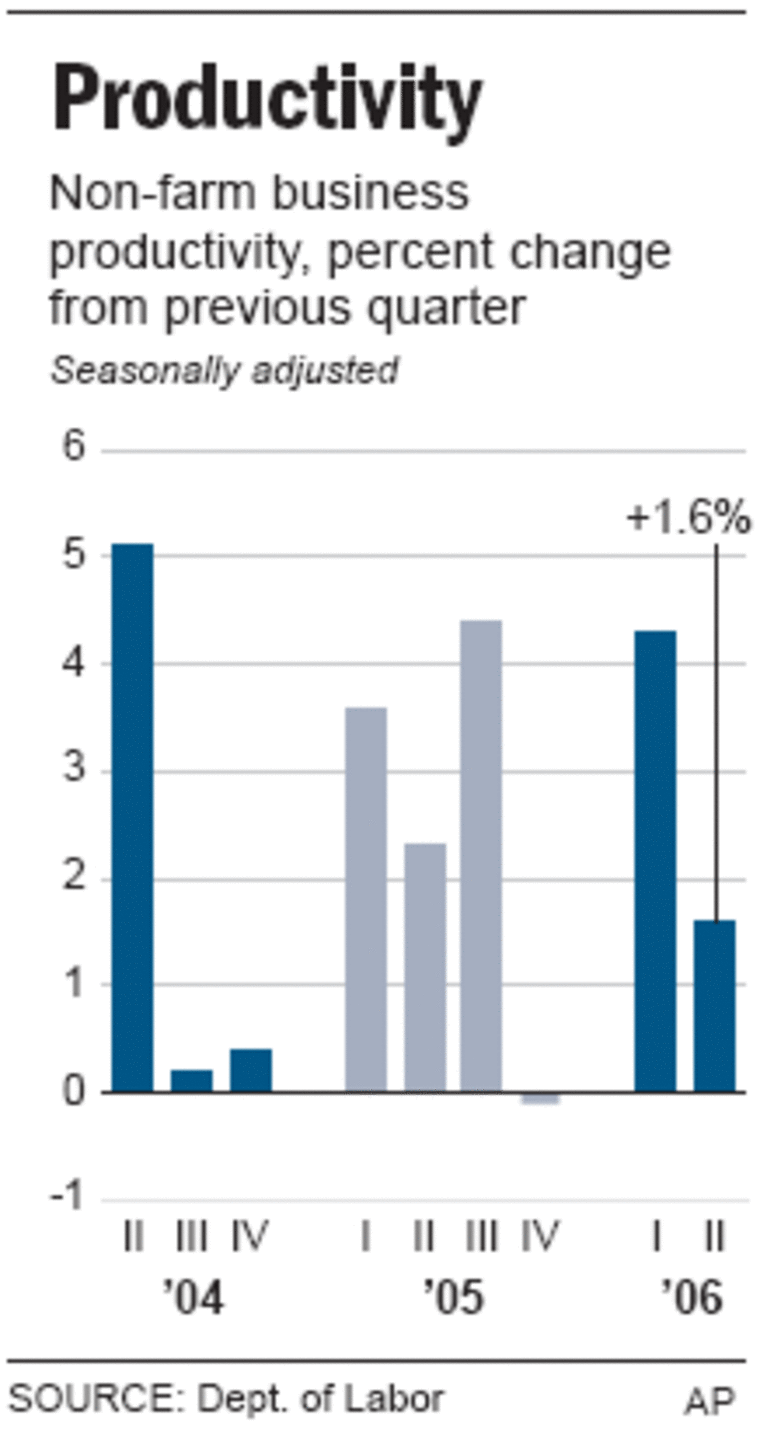The productivity of American workers slowed in the spring while wage pressures increased.
The Labor Department said that productivity, the amount of output per hour of work, increased at an annual rate of 1.6 percent in the April-June quarter, was slightly better than the 1.1 percent increase estimated a month ago but down from a 4.3 percent growth rate in the January-March period.
Wages registered a second sizable increase, rising at an annual rate of 4.9 percent in the second quarter, up from an initial estimate of a 4.2 percent increase — good news for workers, but the kind of development that leads the Federal Reserve Board and economists to worry about inflation.
The second quarter increase followed an even larger 9 percent surge in labor costs in the first three months of the year, which was the biggest quarterly increase in nearly six years.
The first quarter figure was up sharply from a previous estimate that labor costs were rising at a much more moderate 2.5 percent rate in the first quarter. Labor Department analysts said the increase reflected more complete wage data.

While rising wages and benefits help workers, economists see the combination of slowing productivity and rising wage costs as a recipe for unwanted inflationary pressures.
The sharp jump in labor costs raised worries on Wall Street that the Federal Reserve may not be finished boosting interest rates to fight inflation. The Dow Jones industrial average was down more than 30 points in afternoon trading.
The Federal Reserve said Wednesday in its latest survey of regional business conditions that growth slowed in many parts of the country in the past few weeks. The Fed found that five of its 12 regions experienced a slowdown in late July and August, led by weakness in the housing industry.
The report also found scattered labor shortages and rising wage pressures, especially for workers with specialized skills.
Nariman Behravesh, chief economist at Global Insight, said that rising wage costs at a time of slowing productivity would put policymakers at the Federal Reserve “in a very tough spot.”
But other economists saw an upside to the jump in wages, saying it would help consumers keep spending in the face of rising energy costs, higher interest rates and a cooling housing market.
“If households are bringing home larger paychecks, then consumer spending can hold up in the face of ugly headwinds,” said Stephen Stanley, chief economist at RBS Greenwich Capital.
In another report Wednesday, growth in the service sector, where most Americans work, accelerated in August. The Institute for Supply Management, an industry research group, said that its index for non-manufacturing industries stood at 57.0 in August, a better-than-expected reading, and up from 54.8 in July.
Productivity is the key factor determining rising living standards. Strong growth in output allows businesses to pay their workers more without having to raise the cost of their products, which fuels inflation. But the current numbers raise concerns because they show wage pressures rising as productivity growth slows.
The Fed often has cited rising productivity as a reason to believe that inflation is not getting out of control.
Fed policymakers last month took a break after two years of 17 consecutive interest rate increases, sending a signal that they may have done enough to keep inflation at bay.
Most economists believe the Fed will remain on hold at their next meeting on Sept. 20. But some analysts believe the Fed will be forced to raise rates one or possibly two more times later this year in response to worsening news on inflation.
Productivity growth, which had been weak for two decades, began to rebound in the mid-1990s, reflecting the benefits produced by the spread of computers in the workforce.
In a speech last week, Federal Reserve Chairman Ben Bernanke took issue with economists who believe this productivity rebound will not be long-lasting.
Bernanke said he believed a case could be made that “the strong productivity growth of the post-1995 era is likely to continue for some time.”